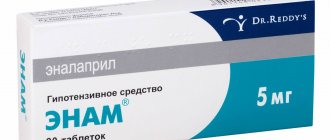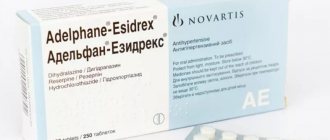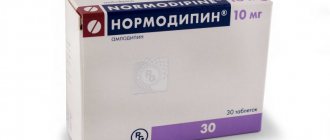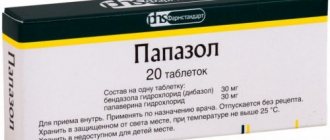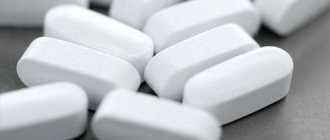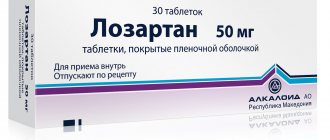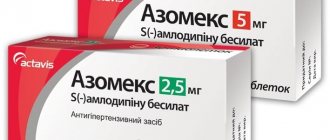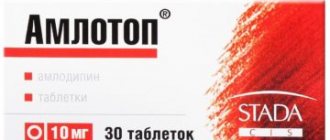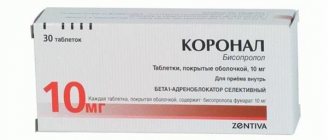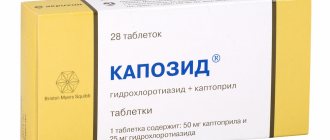Category: Published 02/10/2017 · Comments: · Reading time: 4 min · Views: 7,297
“Hypothiazide”, what does this diuretic medicine help with? The drug has a positive effect on kidney function. The instructions for use suggest taking the drug “Hypothiazide” for nephrotic syndrome, portal hypertension, and premenstrual tension.
Brief information about the drug
Hypothiazide for blood pressure belongs to the pharmacological group of thiazide diuretics. The drug is produced by the Hungarian company CHINOIN Pharmaceutical and Chemical Works Private.
Release form
The blood pressure medicine Hypothiazide is presented on the pharmaceutical market in tablet form with a dividing strip that facilitates the process of dosing the drug. The medicine is sold in blisters containing 20 tablets.
Composition of tablets
The main active component of the drug Hypothiazide is hydrochlorothiazide, presented in dosages of 25 mg or 100 mg.
The tablets also include auxiliary ingredients: lactose monohydrate, gelatin, magnesium stearate, starch, talc.
pharmachologic effect
The drug Hypothiazide is characterized by the presence of diuretic properties and a moderately pronounced hypotensive effect.
Packaging of Hypothiazide tablets
Storage period and conditions
The maximum permissible shelf life of the drug is 4.5 years. It is recommended to store the tablets in a dark place, at a temperature not exceeding +25C.
Conditions for dispensing from a pharmacy
You can purchase a medicine in pharmacy chains only by presenting an appropriate prescription from a specialist.
Price
The price of the drug depends on the dose of the main active ingredient and the number of blisters with capsules in the pack. The estimated cost of Hypothiazide tablets is about 100 rubles.
Indications
Any medicine must be used according to a medical regimen that is developed by a doctor for each patient. You don't need to prescribe anything yourself.
The drug is prescribed for the following conditions:
- high blood pressure. In this case, Hydrochlorothiazide 25 mg is prescribed. It can be combined with taking additional drugs that belong to the group of thiazide diuretics;
- with swelling, which is caused by massive proteinuria, poor kidney function syndrome, insufficient blood supply, the use of hormones (estrogens, corticosteroids), PMS, malaise in pregnant women;
- with pathology of the renal transport systems (nephrogenic diabetes insipidus);
- eye disease such as subcompensated glaucoma;
- increased amount of calcium in the urine, with normal levels of the element in the blood;
- chronic liver disease with severe ascites.
Patients leave the most positive reviews of Hydrochlorothiazide.
Removing excess fluid from the body is indicated for hypertension and many other diseases
What is Hypothiazide used for?
Doctors strongly recommend drinking Hypothiazide for high blood pressure in patients who have the following clinical indications for the use of this drug:
- Hypertonic disease;
- Diabetes insipidus and nephrogenic diabetes (for the purpose of control in the presence of polyuria);
- Arterial hypertension;
- Glomerulonerfit, occurring in acute form;
- Nephrotic syndrome;
- Chronic heart failure;
- Premenstrual tension syndrome;
- Treatment with corticosteroid drugs;
- Chronic renal dysfunction.
Chronic heart failure is one of the indications for the use of the drug
Treatment with Hypothiazide allows you to eliminate edema syndrome of various etiologies, as well as the causes that provoke the development of hypertension and increased blood pressure. The drug can be used for monotherapy, as well as in combination with antihypertensive medications.
Hypothiazide tablets are often prescribed to prevent the development of urolithiasis, hypercalciuria in patients at high risk,
special instructions
- In case of renal failure, monitor the amount of daily urine and blood creatinine.
- For liver diseases, the drug is prescribed with caution, since there is a risk of developing coma.
- When used simultaneously with drugs and alcohol, the decrease in blood pressure increases.
- The drug slows down the speed of reactions, so during treatment it is forbidden to drive a car or engage in mental work.
- In case of low blood pressure and a predisposition to it, the medication is prescribed with caution.
When use is contraindicated
Medical specialists categorically prohibit taking Hypothiazide for high blood pressure in patients who have the following clinical contraindications:
- Anuria;
- Gout;
- Hypotonic disease (low blood pressure);
- Liver failure;
- Individual intolerance and hypersensitivity to substances contained in tablets;
- Ischemic disease;
- Hyponatremia, refractory;
- Hypercalcemia;
- Diabetes mellitus, which is severe and difficult to treat;
- Cirrhosis of the liver;
- Hypokalemia;
- Treatment with cardiac glycosides.
- Age category of the patient, less than 3 years old;
- Addison's disease.
It is not recommended to use Hypothiazide tablets for elderly people suffering from lactose intolerance or kidney pathologies.
Liver cirrhosis is one of the contraindications to taking Hypothiazide
Contraindications
Hydrochlorothiazide tablets, as the instructions for use say, cannot be used for therapy by all patients.
A number of contraindications must be taken into account:
- Anuria;
- Diabetes mellitus with unstable laboratory values;
- Severe liver failure;
- Gout;
- Addison's disease;
- Hyponatremia;
- Hypocalcemia;
- Breastfeeding period;
- Pregnancy (especially in the first trimester);
- Hypersensitivity to sulfonamides.
Tablets are also not prescribed to patients whose medical history is aggravated by lactose deficiency or problems with the absorption of glucose-lactalose. People with cerebral atherosclerosis, eclampsia, and preeclampsia should take medications with extreme caution.
Use during pregnancy and breastfeeding
Hypothiazide for high blood pressure is strictly prohibited for use by patients during the first trimester of pregnancy. At a later date, the doctor may recommend pills to the expectant mother, but only in exceptional cases in minimal doses.
This is due to the fact that, penetrating the placental barrier, the active components of the drug can provoke the development of hepatitis, thrombocytopenia and other undesirable consequences in the child.
The drug also passes into breast milk. For this reason, during lactation, women are advised to either stop taking Hypothiazide tablets or transfer the baby to artificial feeding.
Instructions for use and dosage
Instructions for use of Hypothiazide recommend drinking the tablets as a whole without first crushing or chewing. The optimal dosage of the drug is determined individually, taking into account the exact diagnosis, the severity of the patient’s health condition, his age category and other features of a particular clinical case.
For arterial hypertension
If you have high blood pressure, start drinking hypothiazide in minimal quantities, ranging from 25 to 50 mg per day. At the initial stage of development of arterial hypertension, 1.25 mg of the drug will be sufficient.
The pressure stabilizes after just a few days of use, however, to achieve a stable, maximally pronounced hypotensive effect, it is necessary to undergo a full therapeutic course lasting one month.
The medicine should be taken in the dosage strictly prescribed by the doctor.
For edema syndrome
To eliminate edema syndrome, it is recommended to take the drug in a dosage of 25 to 100 mg, 1-2 times a day.
For diabetes insipidus, hypothiazide is prescribed in an amount equal to 50 mg–150 mg, divided into several equal doses.
Representatives of the fair sex suffering from premenstrual syndrome are recommended to take the tablets in a dose of 25 mg throughout the day. The drug is used from the onset of characteristic symptoms until the onset of critical days.
When treating small patients, the safe dosage of Hypothiazide is calculated by a specialist based on the child’s body weight. On average, the dose of the drug permissible for children aged 3 to 12 years varies from 38 to 100 mg per day.
Analogs
- Hydrochlorothiazide-SAR . It differs only in the manufacturer and the concentration of the active substance (25 mg). The principle of operation in the body and the chemical composition are identical.
- Hydrochlorothiazide-Verte . The tablets provide a noticeable diuretic effect. Its effect in the body lasts 8-12 hours after use.
- Hypothiazide . There are 20 tablets in a package. Doses of a diuretic drug should not be violated, otherwise sudden cardiovascular failure may develop, leading to coma.
- Dichlorothiazide . Tablets with a diuretic effect that last 6-14 hours.
Important Notes
Treatment with diuretic drugs requires strict monitoring of water and electrolyte balance in patients suffering from liver pathologies and cardiac diseases.
Like other potent diuretics, Hypothiazide can adversely affect the condition and functioning of the thyroid gland and parathyroid gland. The drug also affects the patient’s glucose tolerance.
In case of such deviations as convulsive syndrome, rapid heartbeat, muscle pain, severe decrease in blood pressure, excessive drowsiness, psycho-emotional instability, dyspeptic disorders, the use of Hypothiazide should be discontinued or the daily dosage of the drug should be reduced.
Patients with glucose intolerance may experience problems with the functioning of the digestive system during the therapeutic course.
If a patient has liver diseases, it is important to regularly monitor creatine levels in his blood during the therapeutic course.
Careful monitoring by specialists and increased caution requires treatment with Hypothiazide tablets in patients suffering from sclerosis (cerebral or coronary in nature).
Hypothiazide often causes hypokalemia, to prevent which it is recommended to consume foods with a high potassium content and potassium-containing drugs.
During treatment with Hypothiazide, the diet should be enriched with foods containing potassium.
Therapy of patients with liver pathologies requires particularly strict medical supervision, since even with small deviations of the water-electrolyte balance from the norm, the likelihood of developing hepatic coma is high.
Since Hypothiazide has a suppressive effect on the central nervous system, while taking tablets it is necessary to refrain from driving various mechanisms and vehicles.
Adverse reactions
The use of the drug Hypothiazide may cause the following side effects:
- Convulsive syndrome;
- Dehydration of the body;
- Arrhythmia;
- Diarrhea or constipation;
- Hypotonic orthostatic disease;
- Permanent lack of appetite, anorexia;
- Paresthesia;
- Confusion;
- Attacks of severe dizziness;
- Nausea;
- Vomiting;
- Muscle pain;
- Erectile dysfunction in representatives of the stronger sex;
- Pulmonary edema;
- Visual impairment;
- Headache;
- Constant feeling of thirst and dryness in the mouth;
- Asthenic syndrome, weakness, decreased performance;
- Hypokalemia;
- Glucosuria;
- Hyponatremia.
With long-term use of tablets, the development of diseases such as vasculitis, cholecystitis, nephritis, pneumonitis, sialadenitis, pancreatitis, hyperglycemia, and hepatic encephalopathy is possible.
The possible adverse reactions listed above that occur during treatment with Hypothiazide cannot be ignored! Any alarming symptoms should be reported to a qualified professional immediately!
Adverse reactions may include blurred vision
Hypothiazide overdose
An overdose of Hypothiazide leads to dehydration of the body, manifested by the following characteristic clinical signs:
- Nausea and profuse vomiting;
- A sharp decrease in blood pressure to critical levels;
- State of shock;
- Polyuria;
- Alkalosis;
- Muscle spasms;
- Paresthesia;
- Severe dizziness and loss of coordination;
- Rapid heartbeat (tachycardia);
- Clouding of consciousness;
- Severe weakness, malaise;
- Oliguria.
If such symptoms occur, it is necessary to perform a gastric lavage on the victim and give him an activated carbon tablet or other sorbents. In case of shock, treatment is carried out using IV drips in a hospital setting.
Drug interactions
The combination of Hypothiazide with digitalis threatens intoxication of the body, severe manifestations of hypokalemia, hypomagnesemia.
When taking tablets simultaneously with the drug Amiodarone, the likelihood of developing severe arrhythmia increases significantly.
The combination of Hypothiazide with non-steroidal anti-inflammatory drugs reduces the effectiveness of the diuretic.
The combination with opioid analgesics, barbiturates, alcoholic beverages and alcohol-containing drugs greatly enhances the antihypertensive effect of Hypothiazide, which threatens an excessive drop in blood pressure up to a hypotensive crisis.
When taking drugs with hypoglycemic action simultaneously, there is a high probability of developing hyperglycemia, which must be taken into account when selecting the dosage of the drug for patients with diagnosed diabetes mellitus.
The use of corticosteroid drugs greatly increases the excretion of potassium from the patient's body, which can lead to severe hypokalemia.
Hypothiazide is not compatible with all drugs
Pharmacological group
- Thiazide-like or thiazide diuretics
- Medicines that affect kidney function
- Diuretic (diuretic) drugs
Hydrochlorothiazide
is part of combination medicines (analogs):
- cinepress
- adelphanesidrex
- inhibase plus
- adelphanesidrex K
- moduretic
- capozide
- novospirozin
- triampur-compositum
- ategexal compositum
Prices in medical pharmacies of the Russian Federation for different forms and dosages are 85.00 - 136.00 rubles.
Prices in medical pharmacies in Ukraine for different forms and dosages 11.00 - 21.00 UAH.
Reviews about the use of drugs containing hypothiazide are positive.
What to replace for hypertension
On the modern pharmaceutical market you can find and purchase the following analogues of Hypothiazide:
- Hydrochlorothiazide;
- Diuver;
- Arifon;
- Dichlorothiazide;
- Furosemide;
- Veroshpiron;
- Spironolactone;
- Indapamide;
- Lasix;
- Torasemide;
- Insp.
It is important to remember that each of the drugs listed above has its own specifics in terms of dosage and administration, indications and contraindications. For this reason, it is strictly not recommended to independently replace Hypothiazide tablets prescribed by the doctor with one of its analogues. If for certain reasons there is a need for replacement, it is necessary to consult on this topic with a qualified specialist who will select the most effective and safe option and tell you about the features of treatment with another drug.
Hypothiazide is a drug used for blood pressure in order to normalize tonometer readings, eliminate edema syndrome, and congestive phenomena. Effectively fights not only the symptoms of hypertension, but also the causes that provoke the development of pathology. However, Hypothiazide tablets, due to their powerful diuretic effect, can provoke dangerous consequences, such as dehydration and water-electrolyte imbalance. The drug requires individual selection of dosage and medical supervision, especially when it comes to patients suffering from cardiac diseases, diabetes mellitus, liver pathologies, and renal dysfunction.

